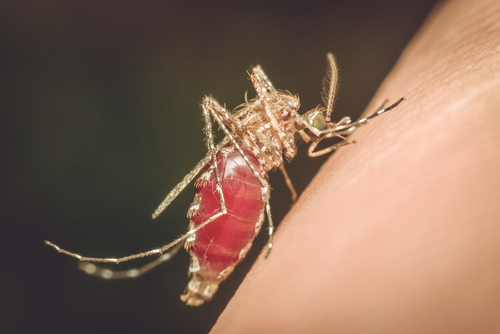Mosquito gut may hold the key to preventing Dengue and Zika
Purdue University Research news Feb 20, 2018

The midgut of a mosquito may hold the key to preventing mosquito-borne diseases like Zika and Dengue, according to research published in PLOS Pathogens.
A mosquito's ability to replicate and transmit a virus depends on the metabolic environment of tissues in its midgut: the primary site of infection. By targeting the sphingolipid pathway, which links together several pathways important for cell signaling and subcellular structure that are altered by virus infection, researchers could devise strategies that stall viral replication in the mosquito and prevent its transmission to humans.
“The strategies that are being used right now often involve sterilizing mosquitoes or eradicating them, and those might work, but a subtler way would be simply changing the ability of the virus to exploit a pathway and let the mosquito continue on like nothing happened,” said Richard Kuhn, director of Purdue’s Institute of Inflammation, Immunology, and Infectious Disease. “It’s fairly common these days to alter the expression of genes, so we might be able to create a different form of the enzyme that is not susceptible to virus manipulation.”
Arboviruses move between mosquitoes (or ticks) and hosts. After an infected mosquito bites a host, the host comes down with the disease, and eventually another mosquito bites the host, picks up the disease in its blood meal and the cycle continues.
When a mosquito is infected, its metabolism changes to accommodate the virus. In the case of Aedes aegypti, the “yellow fever mosquito,” there are big fluctuations in molecules that function as membrane building blocks, energy storage molecules, and intermediates in lipid production.
These changes could be a result of cellular resources being redistributed for viral replication, the cellular response to infection, or both. The consequences for the mosquito aren’t totally clear. Unlike humans who get sick or die, mosquitoes seem to be fine.
In mammals, infected cells usually die. Mosquito cells survive, but there must be some negative consequence, said Kuhn, the Trent and Judith Anderson Distinguished Professor in Science.
“It’s like a bunch of people invading a house and reorganizing it to support mischievous activity they want to do in there,” he said. “The virus goes in and makes changes to the cell. In this case, it’s changing lipid biosynthesis, which is fundamental to all life.”
The study describes the first comprehensive analysis of the Aedes aegypti midgut. Usually, this type of experiment is done in cells, and researchers make assumptions about how the results would translate to a human or mosquito.
“Here, we’re looking directly at the mosquito,” Kuhn said. “I can’t tell you how much work it was to isolate a sufficient number of mosquito midgut cells that were infected with Dengue virus.”
Arboviruses are endemic in tropical and subtropical regions of the world, but rising temperatures are expanding the areas in which mosquitoes can thrive. Cases of Dengue have increased 30-fold over the past 50 years, and climate is known to be one of the important drivers. As Dengue and other arboviruses become more prominent, techniques for mitigating them could become dire.
-
Exclusive Write-ups & Webinars by KOLs
-
Daily Quiz by specialty
-
Paid Market Research Surveys
-
Case discussions, News & Journals' summaries